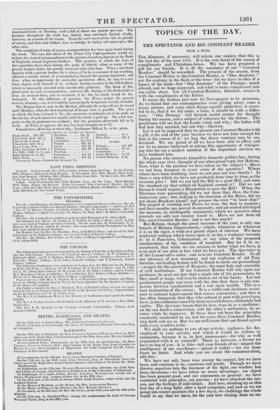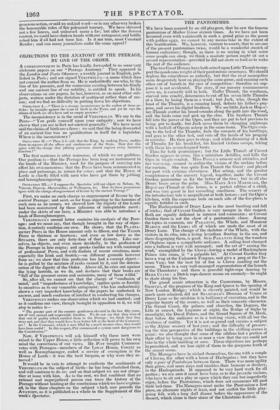TOPICS OF THE DAY.
THE SPECTATOR AND HIS CONSTANT READER
TETE A TREE.
THE Almanac, if necessary, will inform our readers that this is the last day of the year 1831. It is the very heart of the season of compliments and Christmas-boxes. We too have prepared a gift for our friends. It is fit the constancy of our " Constant Readers" should be rewarded. The present of the season, front the Constant Writer to the Constant Reader, is " Our Anatomy not the anatomy in the flesh or the bone—for we have no idea of a legacy of the kind—but " Our Anatomy" of the Peerage ; much altered, and we hope improved, and what is more, compressed into one entire sheet. Let all Constant Readers, therefore, receive it with the compliments of the Editor. It seems the fashion just now for Newspapers to be generous. As we found that our contemporaries were giving away, some a penny picture, and some other things equally attractive, it occur- red to us, that if we did make a boon, it should be with a differ- ence. " Our Peerage " will furnish useful matter for thought during the season, and a subject of reference for the future. The gentlemen will see how the Lords voted, and why ; the ladies will find how they married, but not why—likewise. Let it not be supposed that we present our Constant Reader with a gift at the end of the year because we have not done enough for him in the course of it : we beg the direct contrary may be un- derstood. We are proud of all we have been able to effect, and are by no means backward at taking this opportunity of whisper- ing into his ear a modest mention of the important services we have rendered him.
No person who interests himself in domestic politics has, during the whole year 1831, thought of any other grand topic but Reform. Now, what is the position we have taken on the subject ?—Have we not been foremost in every crisis of the question ? Where others have been doubting, have we not seen our way clearly ? Is there a step which we have not predicted, from time to time, as the occasion grew ? Did we not hail the Bill as a good Bill, and raise the standard cry that rallied all England around it ? Did we not foresee it would require a Dissolution to pass the Bill? When the Elections were proceeding, did we not show that, then, the Com- mons were sure; but, looking in the direction of the Peers, did. we not shout, Breakers ahead! and prepare the crew "to 'bout ship?" The project of creating new Peers, we were the first to propose ; and have months ago proved its necessity, and advocated and urged the measure, by inefragable arguments, which we perceive other journals are only now corning round to. Have we not done all this, most Constant Reader; and is not this much?
But Reform, though the great measure of the year, is only one branch of Human Improvement,—which, whenever or wherever it is on die tapis, is with us a grand object of interest. We have neglected nothing which turns upon it, or has a tendency towards it: be it Poor-laws, Colonization, or any other of the proposed ameliorations of the condition of mankind. But let it be re- membered, that while we are anxious to better what we have, it is no part of our plan to lose what we have got. The Spectator is of the Conservative order; and so is our Constant Reader. In all our advocacy of new measures, and our explosion of old Tory doctrine, one leading feature will be found to mark our proceedings —respect for the sanctity of Property, the most holy and venerable of civil institutions. It our Constant Reader will rely upon our guidance, he need not fear that a single iota of his possessions, be they small or large, will ever be shaken out of his hands. Let not t,. e.00dnatured people run away with the idea that there is any con- nexion between amelioration and a war upon wealth. This is a base insinuation of the enemy. It is a wilful and obstinate resist- ance to rational improvement that causes concussion; and thus it has often happened, that they who refused to part with privileges, have, in the confusion caused by their own selfishness, ultimately lost rights. The Spectator boasts that he here steps in as a mediator: on the one hand a conservator, and the other a meliorator, he se- cures while he improves. If these have not been the principles constantly inculcated by us, now for years, then, Constant Reader, step forth and say so. But we are well aware that our friend agrees with every word we write. We shall say nothing to you of our activity, vigilance, &c. &e. employed in your service, and which it would be tedious to enumerate, because it is, in fact, unnecessary—for who so well acquainted with it as yourself? There is, however, a favour we have to beg of you : it is this—tell your friends of us—impart the intelligence of our excellence—spread it widely—let our fame know no limits. And while you are about the communication, add this : We have not only been wise among the sapient, but we have been, and continue to be, courteous and gentle. Though we have thrown ourselves into the foremost of the fight, our warfare has been chivalrous—we have taken no mean advantage : our object has been general good, and our arguments as general : we have combated with principles not persons : we have attacked the rea- son, not the feelings of individuals. And here, standing up on this last day of a long fight, after a hard campaign, and just as we are going into winter-quarters (for a few days), we challenge the whole world to say that we have, for the year now closing, done an un- generous action, or said an unkind word—or in any other way broken the honourable rules of fair polemical tourney. We have shivered not a few lances, and unhorsed many a foe; but after the fiercest contest, we could have shaken hands with our antagonist, and boldly asked him if all had not been fair. Is it not true, most Constant Reader; and can many journalists make the same appeal?



















































 Previous page
Previous page